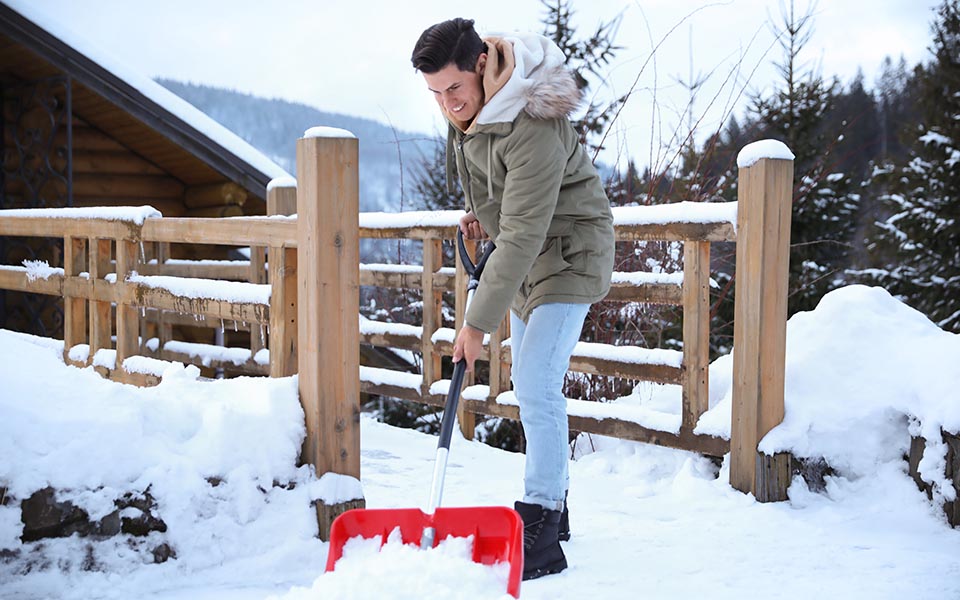Vacation rental owners face unique risks every day. Harsh winter weather elevates those risks with ice and snow build-up, ice-covered tree limbs and walkways, and freezing pipes. Those risks lead to increased property damage and liability claims.
Let’s take a look at the top five winter vacation home insurance claims and ways you can reduce the risk of having to file a claim.
Frozen Pipes
Winter’s frigid temperatures lead to the most common and expensive vacation home claim – water damage caused by frozen pipes. Use pipe sleeves or heat tape to insulate pipes in areas that are susceptible to freezing, such as garages, crawl spaces, and basements. Take it a step further by installing a water detection device that alerts you when a leak occurs. Don’t forget to disconnect, drain, and store outdoor hoses before the first freeze of the season. Close indoor valves that supply outdoor spigots. If you close your property for the winter, shut off the main water valve, open up your faucets, and drain your water lines.
Fire
The chances of home fires in the winter are increased because of drier air, large gatherings and meals, and increased use of fireplaces and space heaters. Following correct maintenance and safety precautions is your best line of defense to prevent a fire. Most insurance carriers require operational fireplaces, chimneys, flues and wood-burning stoves to be cleaned and inspected annually.
Slip-and-Fall Accidents
Slips and falls account for millions of hospital visits each year. According to the Centers for Disease Control (CDC), $12 billion is paid by private or out-of-pocket payers for non-fatal fall injuries each year. Snow and ice contribute to an increase in slip and fall injuries. If one happens on your property, you could be held liable.
Reduce the risk of a winter slip and fall by keeping your walkways, driveway, and outdoor steps free from ice and snow. Apply a commercial-grade ice melt product to melt the ice, provide traction, and prevent refreezing and black ice.
If you’re unable to clear snow and ice at your property, consider hiring a professional snow removal service or property management group.
Property Damage from Snow and Ice
Snow and ice can provide an idyllic setting, but they can also wreak havoc on your vacation rental home. Heavy snow and ice can weigh down weak tree branches, causing them to fall, possibly injuring someone or causing damage to your vacation rental property. When the weather allows, have weak branches and dead or dying trees removed.
Ice dams are another common problem caused by snow and ice. Ice dams are formed in your gutters when snow and ice melt and refreeze. Ice dams can cause water runoff to back up, potentially seeping through your roof, causing damaged ceilings, walls, roof structure, and more. Keeping your gutters clean can help prevent ice dams.
Don’t Get Blown Away by Wind Damage
Wind damage is a top claim source. Winter storms and changing weather can create massive gusts, causing major property damage.
Remove anything outside that isn’t secured to the ground – furniture, shade umbrellas, and play equipment. These items can become projectiles and cause serious damage to your property (or a neighbor’s).
Inspect your gutters, fence, shutters, and home exterior for loose items and make repairs before the wind has a chance to damage them further.
Protect Your Property with Vacation Rental Insurance
Preventative measures can reduce your risk, but still, claims happen. Vacation rental insurance can help protect you from these common winter claims and more with property damage, liability coverage, and loss of income protection. Don’t let the winter woes get the best of you. Request a free quote today!
This blog may contain scenarios that are provided as examples only. Coverage is subject to the terms, conditions and exclusions of the policy issued. The information provided is general in nature and may be affected by changes in law or the interpretation of such laws. The reader is advised to contact a professional prior to taking any action based upon this information.

